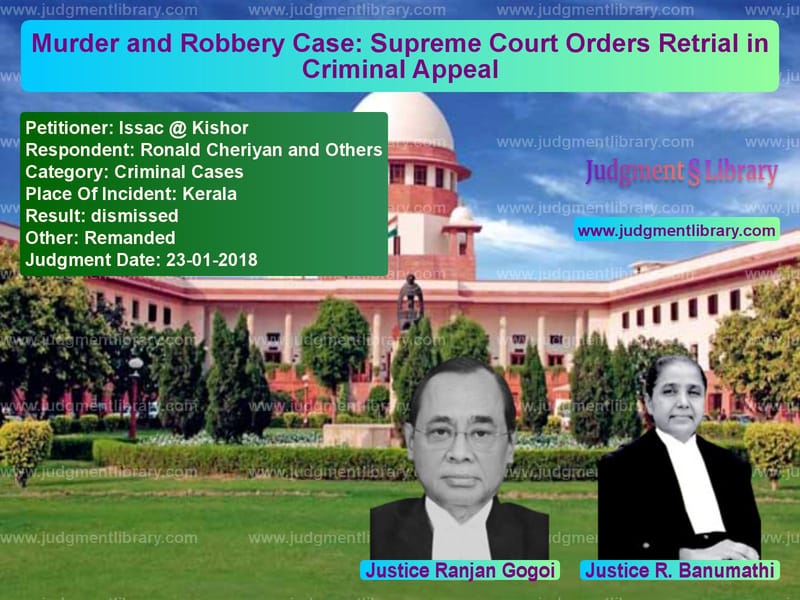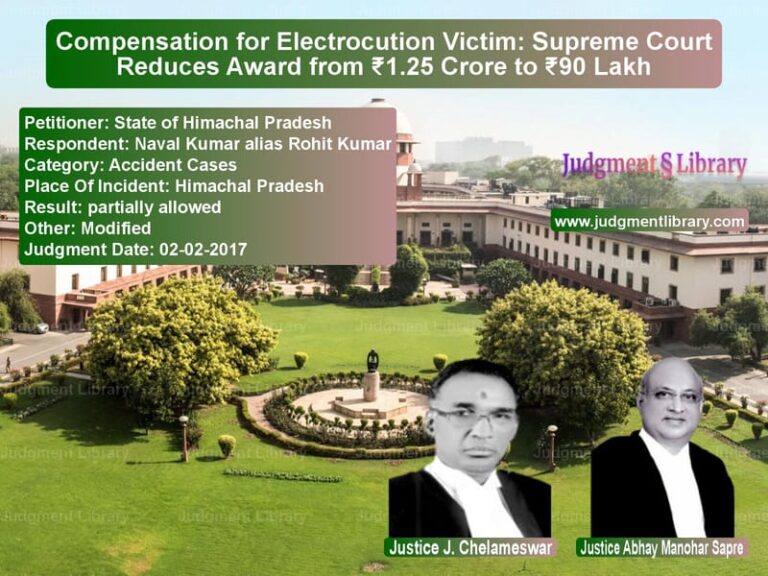Murder and Robbery Case: Supreme Court Orders Retrial in Criminal Appeal
The case of Issac @ Kishor vs. Ronald Cheriyan & Ors. revolved around a gruesome crime of murder and robbery that took place in Kerala. The case underwent a lengthy judicial process, including a trial, appeal, and ultimately a decision by the Supreme Court of India. The Supreme Court, in its ruling dated January 23, 2018, upheld the Kerala High Court’s order for retrial due to significant lapses in the trial process, particularly regarding the omission of Section 34 IPC charges.
The case serves as an important precedent in criminal jurisprudence concerning fair trials, evidentiary requirements, and the powers of appellate courts in cases of acquittal.
Background of the Case
The case involved the murder of Brijitha, a 63-year-old widow, who was residing alone on her five-acre agricultural land in Kerala. The appellant, Issac @ Kishor, was an employee in her household. On the night of February 6, 2006, the victim’s sister-in-law, who lived nearby, heard screams from Brijitha’s house. Upon investigation, her son, PW-1 (Cheriyan @ Shabin), found the appellant tied with a rope in the kitchen and the victim lying unconscious in the front room. The appellant claimed that five thieves had broken in, suffocated Brijitha, and robbed her house before tying him up.
PW-1 immediately informed the deceased’s eldest son, Ronald Cheriyan, and took the victim to St. John Hospital, where she was declared dead. A case under Section 396 IPC (dacoity with murder) was registered based on the initial statement of PW-1.
Investigation and Arrest
The police conducted an extensive investigation, during which the appellant-accused No. 1, Issac @ Kishor, was arrested on February 7, 2006. Based on his disclosure statement, another accused (accused No. 2) was located and arrested. The police recovered gold ornaments, cash, and a shawl used to suffocate the deceased from accused No. 2’s house. The forensic investigation also found grey hair on the shawl, which was preserved as evidence. The post-mortem report confirmed that the cause of death was smothering.
Upon completion of the investigation, the police filed a charge sheet against the accused under Sections 302 (murder) and 394 (robbery) IPC read with Section 34 IPC (common intention).
Trial Court’s Verdict
The trial court found accused No. 2 guilty under Sections 302 and 394 IPC based on several crucial findings:
- Fingerprints of the accused were found at the crime scene.
- Gold ornaments and cash stolen from the victim’s house were recovered from accused No. 2’s residence.
- The shawl used in the crime contained grey hair belonging to the victim.
- Accused No. 2 was in financial distress, which provided a motive for the crime.
However, the trial court acquitted accused No. 1 (Issac @ Kishor) on the grounds that his disclosure statement regarding accused No. 2’s involvement and the location of the stolen items was insufficient to establish his guilt. The court also held that the presence of the appellant’s fingerprints at the scene was inconsequential, given his employment at the victim’s house.
High Court’s Review and Order for Retrial
Aggrieved by the trial court’s acquittal of accused No. 1, the deceased’s eldest son, Ronald Cheriyan, filed a criminal revision petition in the Kerala High Court. The High Court found several irregularities in the trial proceedings:
- The trial court failed to frame charges under Section 34 IPC despite acknowledging the issue of common intention between the accused.
- The forensic expert who prepared the fingerprint report (Ex.P8) was not examined during the trial, leading to an evidentiary gap.
- The trial court did not adequately assess whether accused No. 2 could have committed the crime alone without the help of accused No. 1.
- There were no injuries on the appellant (accused No. 1) despite his claim of being tied up by robbers, raising suspicion about his version of events.
Based on these findings, the High Court set aside the trial court’s acquittal and ordered a retrial.
Supreme Court’s Ruling
The matter was escalated to the Supreme Court, which had to decide whether the High Court was justified in setting aside the trial court’s acquittal and ordering a retrial. The Court examined the scope of Section 386 CrPC, which defines the powers of appellate courts in criminal appeals.
The Supreme Court emphasized that retrials should only be ordered in exceptional cases where procedural irregularities have materially affected the trial. The Court noted:
“Retrial should not be ordered merely due to some irregularities but may be necessary when the original trial has been unsatisfactory due to lapses such as improper framing of charges, wrongful exclusion or inclusion of evidence, or misappreciation of facts.”
The Court referred to precedents such as K. Chinnaswamy Reddy vs. State of Andhra Pradesh, which held that a High Court can interfere with acquittals only in exceptional cases where there is a glaring procedural defect or miscarriage of justice.
The Supreme Court upheld the High Court’s decision, stating that the omission of Section 34 IPC charges and the failure to examine the fingerprint expert constituted serious procedural lapses that necessitated a retrial. The Court concluded:
“The High Court correctly exercised its discretion under Section 386 CrPC in directing a retrial, as the omissions in the trial materially affected the outcome.”
Accordingly, the Supreme Court dismissed the appeal and directed the trial court to proceed with the retrial expeditiously.
Conclusion
The Supreme Court’s ruling in Issac @ Kishor vs. Ronald Cheriyan & Ors. highlights the judiciary’s commitment to ensuring that justice is served through fair trial procedures. By upholding the High Court’s order for a retrial, the Supreme Court reaffirmed that procedural errors and omissions in framing charges must be rectified to prevent miscarriages of justice.
Don’t miss out on the full details! Download the complete judgment in PDF format below and gain valuable insights instantly!
Download Judgment: Issac @ Kishor vs Ronald Cheriyan and Supreme Court of India Judgment Dated 23-01-2018.pdf
Direct Downlaod Judgment: Direct downlaod this Judgment
See all petitions in Murder Cases
See all petitions in Bail and Anticipatory Bail
See all petitions in Attempt to Murder Cases
See all petitions in Judgment by Ranjan Gogoi
See all petitions in Judgment by R. Banumathi
See all petitions in dismissed
See all petitions in Remanded
See all petitions in supreme court of India judgments January 2018
See all petitions in 2018 judgments
See all posts in Criminal Cases Category
See all allowed petitions in Criminal Cases Category
See all Dismissed petitions in Criminal Cases Category
See all partially allowed petitions in Criminal Cases Category







